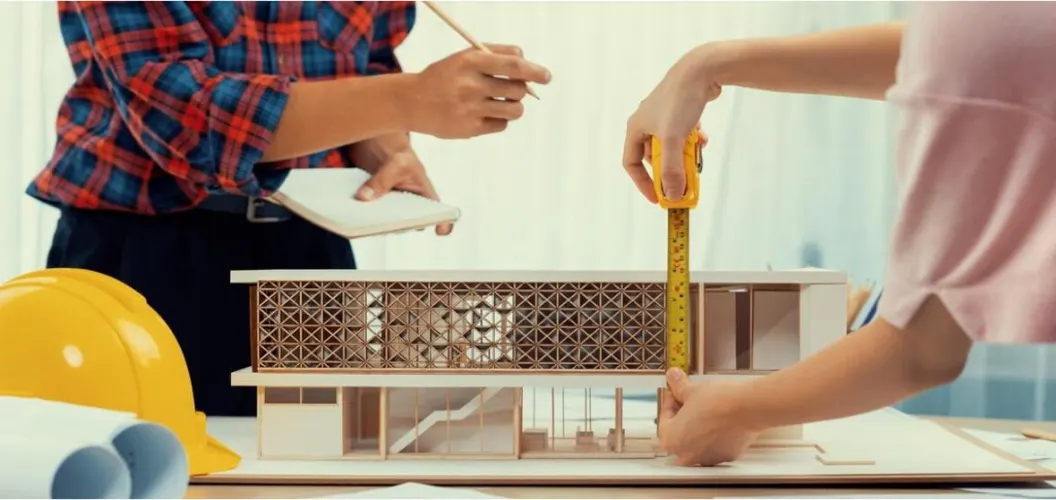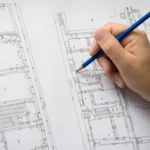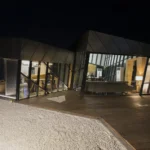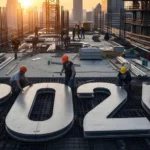Planning a residential construction or commercial construction and wondering whether modular or traditional (“stick‑built”) construction is the better path for your project? With the rise in modular construction across the globe, many face this dilemma. Costs, schedule, design freedom, quality of construction, and variable risks are certain factors on which this choice depends.
In this article, we will walk you through both approaches, compare their strengths and weaknesses, and explain why we often lean towards traditional construction (without ruling out modular entirely) for our residential and commercial builds.
Overview Of Modular and Traditional Construction
Before we dive deeper into which construction type is better for your project, let’s clarify what each term means:
- Modular construction (also called prefabricated or off‑site construction) is a process where large building “modules” or sections (rooms, modules, panels) are fabricated in a factory under controlled conditions, then transported to the construction site and assembled.
- In traditional construction (or stick‑built construction), all of the building work happens on the project site: laying foundations, erecting the structural frame, finishing walls, installing systems, etc.
Each approach has trade‑offs. The decision depends heavily on project scale, design complexity, location, your priorities, and the expertise of your construction company.
Key Differences Between Modular & Traditional Construction
Here’s a detailed comparison between modular and stick-built construction to give you a clear understanding of which construction method is best suited for the Indian landscape.
1. Speed / Schedule
- Modular Construction
Modules can be built while site work (foundation, utilities) proceeds in parallel, reducing overall time by 20 % to 50 % in certain projects.
- Traditional Construction
Site work and structure proceed sequentially. Delays from weather, labour, or material supply tend to push the deadlines further.
2. Cost & Predictability
- Modular Construction
A factory environment gives predictability, allows bulk procurement, less waste, and fewer rework costs. Usually, modular projects have fewer cost overruns.
- Traditional Construction
Costs are more variable. On‑site uncertainties, inflation of material prices, labour constraints, and ad‑hoc change orders often push budgets beyond the threshold.
3. Quality Control & Consistency
- Modular Construction
Modules are built in a controlled environment with rigorous QA/QC, reducing the chances of defects and variability.
- Traditional Construction
Quality depends heavily on craftsmanship, worker skill, site supervision, and weather exposure. There is a fair chance of on‑site defects, moisture intrusion, and variability.
4. Design Flexibility / Customisation
- Modular Construction
Modern modular systems allow a good degree of customization, façade choices, and hybrid layouts, but extremely irregular or highly artistic forms can be a challenge.
- Traditional Construction
You get almost unlimited design freedom. You can adapt on the fly to site conditions, change plans, sculpt forms, or match architectural flair.
5. Logistics & Transportation Risks
- Modular Construction
Modules must be transported (often large, heavy, and sensitive). Damage, transportation constraints, or lifting challenges may occur.
- Traditional Construction
There are no heavy module transports except for raw material transportation. All construction is local, so no risk of damage in transit.
6. Site Disruption & Environmental Impact
- Modular Construction
Less on-site work means reduced noise, dust, site disturbance, and material waste.
- Traditional Construction
Longer on-site presence, more waste, more disturbance, and more chances of accidents happening.
7. Expertise & Ecosystem Requirements
- Modular Construction
Requires modular‑specialist architects, engineers, and contractors. In India, such expertise is still emerging, and very few firms exist that do justice to modular construction.
- Traditional Construction
There are stable supply chains, abundant local craftsmen, and familiarity among contractors, architects, and regulators.
8. Regulation, Codes & Acceptance
- Modular Construction
Sometimes, regulatory or code barriers, approval processes for modular components, and local acceptance can slow down the construction process.
- Traditional Construction
This is an established practice with known pathways for getting building permits, inspection checks, and compliance certificates.
9. Long‑Term Durability and Maintenance
- Modular Construction
Modular buildings can be durable, but long-term durability depends heavily on design, materials, joints, and execution. There are certain complications in the maintenance of module joints, interface zones.
- Traditional Construction
Easier to inspect, repair or upgrade individual structures. The ongoing maintenance and renovation is much easier.
How RS Builders Approaches Your Project
At RS Builders, led by our visionary founder Ravijeet Singh, we aim to deliver structurally mesmerising buildings that align with your vision, budget, and timeline. When you approach us, here is how we proceed:
-
Initial Consultation
We begin with a detailed discussion to understand your vision, requirements, and budget. This helps us align expectations and establish project objectives from the outset.
-
Site Assessment & Feasibility Study
Our experts conduct a comprehensive site survey, reviewing conditions, constraints, and opportunities. A feasibility study is then carried out to ensure the project is practical and compliant with regulations.
-
Detailed Design & Costing
Once we have the detailed architectural and structural drawings of your project, we calculate precise cost estimates and timelines to provide complete project transparency.
-
Approvals & Documentation
We manage all necessary approvals, permits, and compliance documentation, ensuring every detail is in line with local building standards and legal requirements.
-
Procurement & Resource Planning
From sourcing high-quality materials to scheduling skilled labour and equipment, we plan every resource needed to execute the project efficiently.
-
Construction Execution
Our site teams carry out the build with strict adherence to design, safety protocols, and quality standards. Regular progress reviews are conducted to keep clients updated.
-
Quality Checks & Inspections
At every milestone, we implement rigorous quality control and safety inspections, ensuring the project meets the highest standards before handover.
-
Final Handover
On completion, we conduct a detailed walkthrough with you, addressing final touches and ensuring complete satisfaction before formal handover.
-
Aftercare & Support
Our commitment doesn’t end with project delivery. We provide post-construction support, addressing any queries and ensuring long-term reliability of our work.
Conclusion: Which One Suits Your Project?
To summarise: modular construction is powerful, but not always the best construction process for every building — especially in India’s present context. For residential and commercial constructions where design nuance, adaptability, and legacy factors matter, traditional construction is the most reliable, controllable, and flexible. Yet as modular construction evolves, expertise grows, and supply chains mature in India, its feasibility will expand.
Trust us for your next big residential or commercial project, as we are the best builders in Mohali. Leave all your construction worries to us, and we’ll make sure your project is completed within the stipulated time and budget. With us, your vision will become a structure that lasts.
Frequently Asked Questions
1. What is the main difference between modular and traditional construction?
Modular construction involves building sections in a factory and assembling them on-site, while traditional construction takes place entirely at the project site.
2. Is modular construction always faster than traditional construction?
Generally, yes. Since modules can be built alongside site preparation, modular projects can be completed 20–50% quicker. However, transport and logistics may affect timelines.
3. Which construction method is more cost-effective in India?
Modular projects offer cost predictability and less waste, but in India, traditional construction often remains more practical due to established supply chains and skilled labour availability.
4. Can modular construction match the design flexibility of traditional builds?
Modular systems now allow customisation and hybrid layouts, but highly intricate or artistic designs are still better suited to traditional construction.
5. Why does RS Builders prefer traditional construction for most projects?
Because it offers greater design freedom, proven durability, and smoother regulatory approval, making it ideal for residential and commercial projects in India.





